How does my spouse or common-law partner impact my CRS score?
Most newcomers applying through Canada’s economic immigration pathways will want to bring their spouse or common-law partners with them. Canada’s immigration system is sensitive to these needs.
Having a loved one in your immigration application can impact your Comprehensive Ranking System (CRS) score. While certain scoring sub-categories may be negatively impacted by the presence of a spouse or common-law partner, the presence of a significant other in a newcomer’s immigration application generally has a positive effect.
Below we will breakdown score groups A and B of the CRS—the two scoring groups that are impacted by the inclusion of a significant other—and exactly how having a spouse or common-law partner in your application may impact your CRS score.
Note: Even if not accompanying you (the principal applicant), dependents—like a spouse or common-law partner—must be included in an application for Canadian immigration (in this case they are a “non-accompanying spouse or common-law partner”). Additionally, eligibility criteria around proof of funds, medical and criminal admissibility must be met for all those included in an application. However, if your spouse or common-law partner is not accompanying you to Canada, they will not impact your CRS score, and you will be assessed as a single applicant.
Discover if You Are Eligible for Canadian Immigration
Category A: Human Capital factors
This section of the CRS takes into account such factors as: age, level of education, official language (English and French) proficiency, and Canadian work experience.
With an accompanying spouse or common-law partner included, applicants can receive a maximum of 460 points for all factors.
With a non-accompanying spouse or common-law partner, applicants can receive a maximum of 500 points.
Age
The highest attainable scores for age in Canada’s go to those between 20-29 years of age. In terms of scoring here, having an accompanying spouse or common-law partner generally negatively impacts an applicant’s score.
Applicants with an accompanying spouse or common-law partner can earn a maximum of 100 points for their age, while those with a non-accompanying significant other earn 110 points at most.
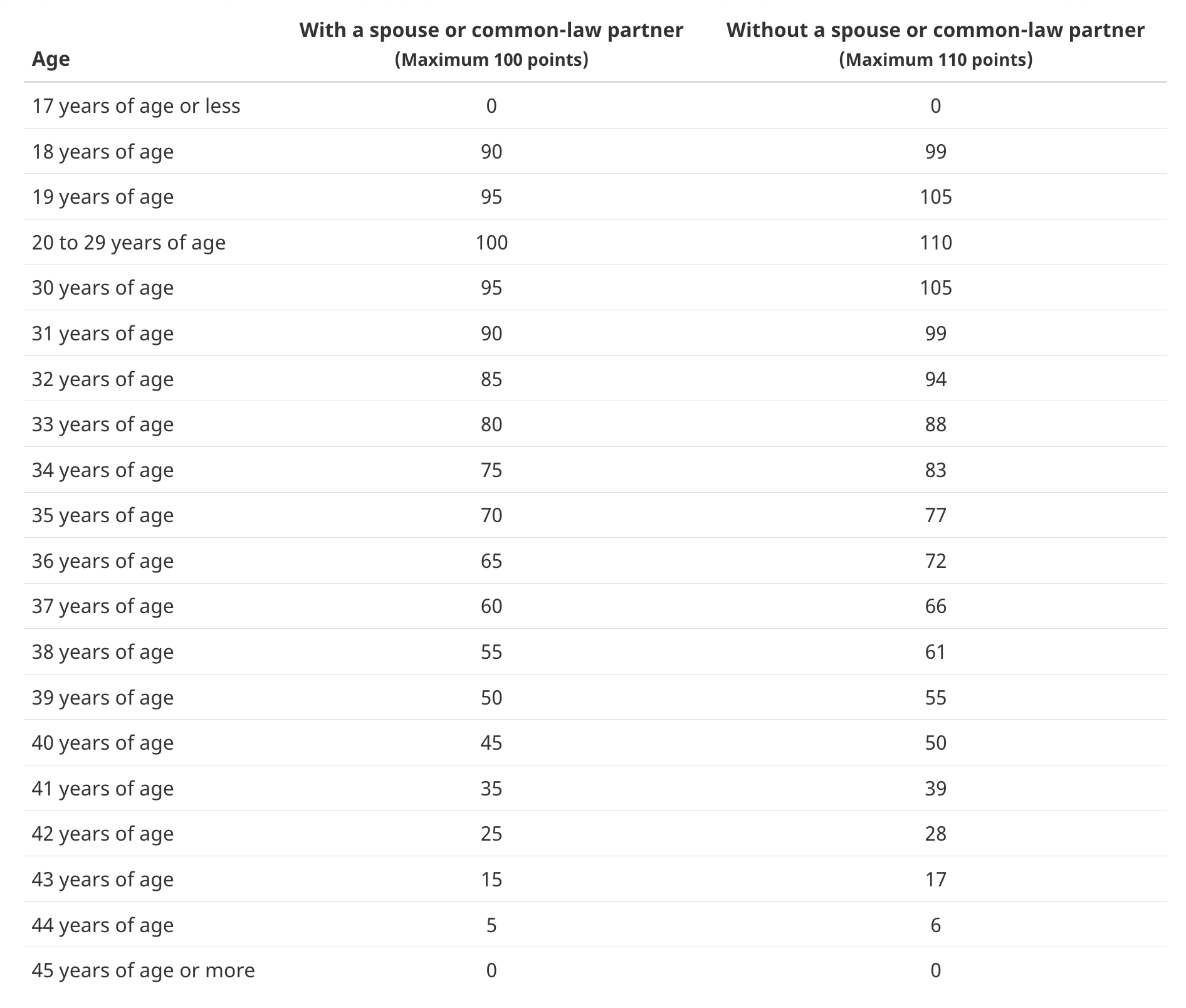
Level of Education
The CRS places value on high levels of education, with candidates receiving more points as their level of education increases. Here too, having an accompanying spouse or common-law partner may lower the score allocation that you (the principal applicant) receives.
Applicants with an accompanying spouse or common-law partner can earn a maximum of 140 points for their level of education, whereas applicants with a non-accompanying spouse or common-law partner can earn a maximum of 150 points.
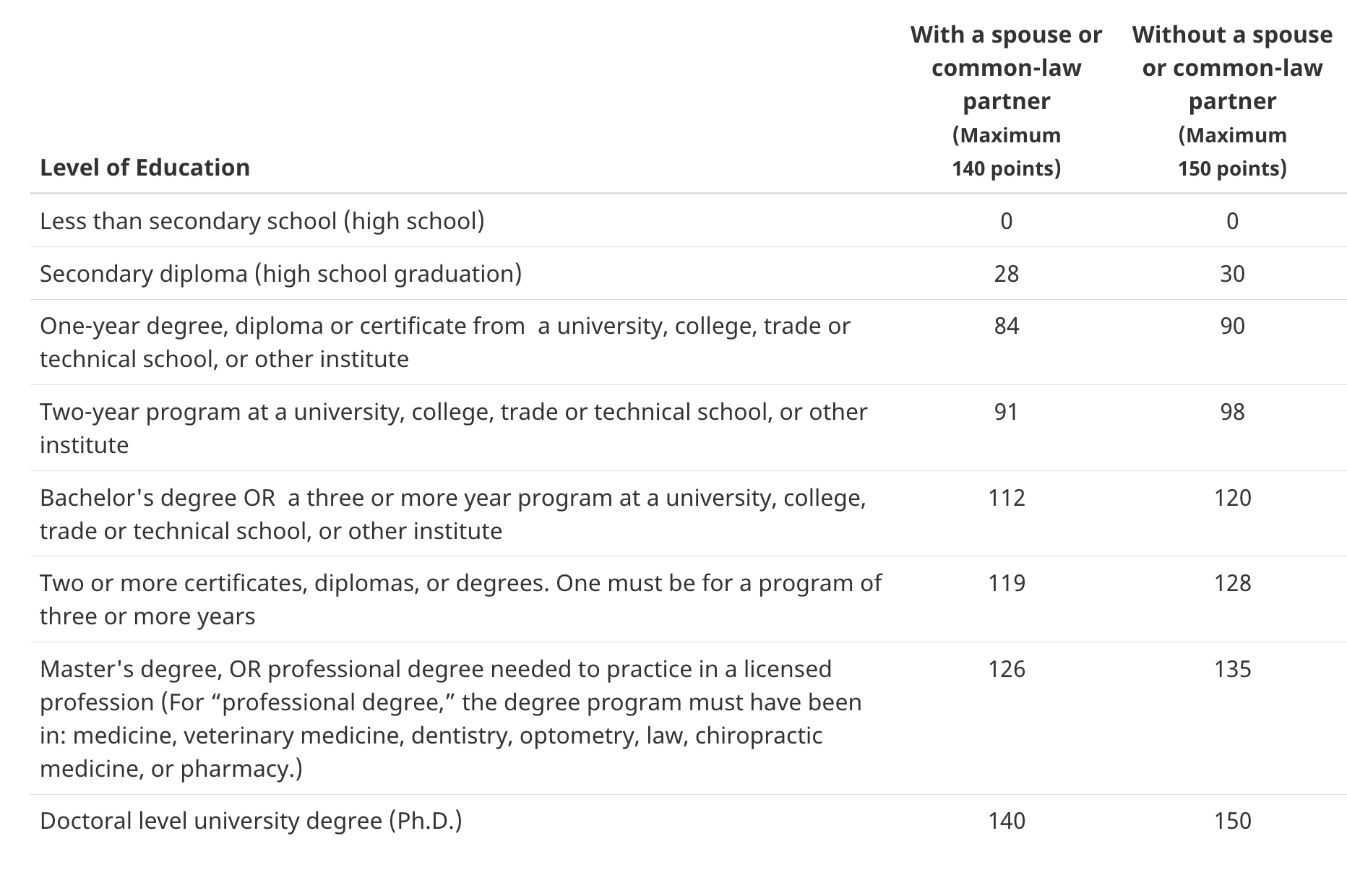
Official language ability (first and second language)
Proficiency in Canada’s official languages (English and French) are important to the CRS. As such, the greater ability that an applicant can demonstrate in either of these languages, the more points are awarded to them—with extra points delivered to those who have proficiency in both French and English.
Here too if your spouse or common-law partner is accompanying you (the principal applicant) it can reduce your CRS score. Candidates with an accompanying significant other score a maximum of 32 points per language skill (reading, writing, speaking and listening) in their first official language, while those with a non-accompanying significant other earn a maximum of 34 points per skill.
For second language proficiency whether a spouse or common-law partner is accompanying you or not, applicants earn 6 points per skill, but those with a spouse or common-law partner accompanying them are capped at 22 points in total—while those with a non-accompanying spouse or common-law partner can earn a maximum of 24 points.
Below are the grids outlining this scoring weightage.
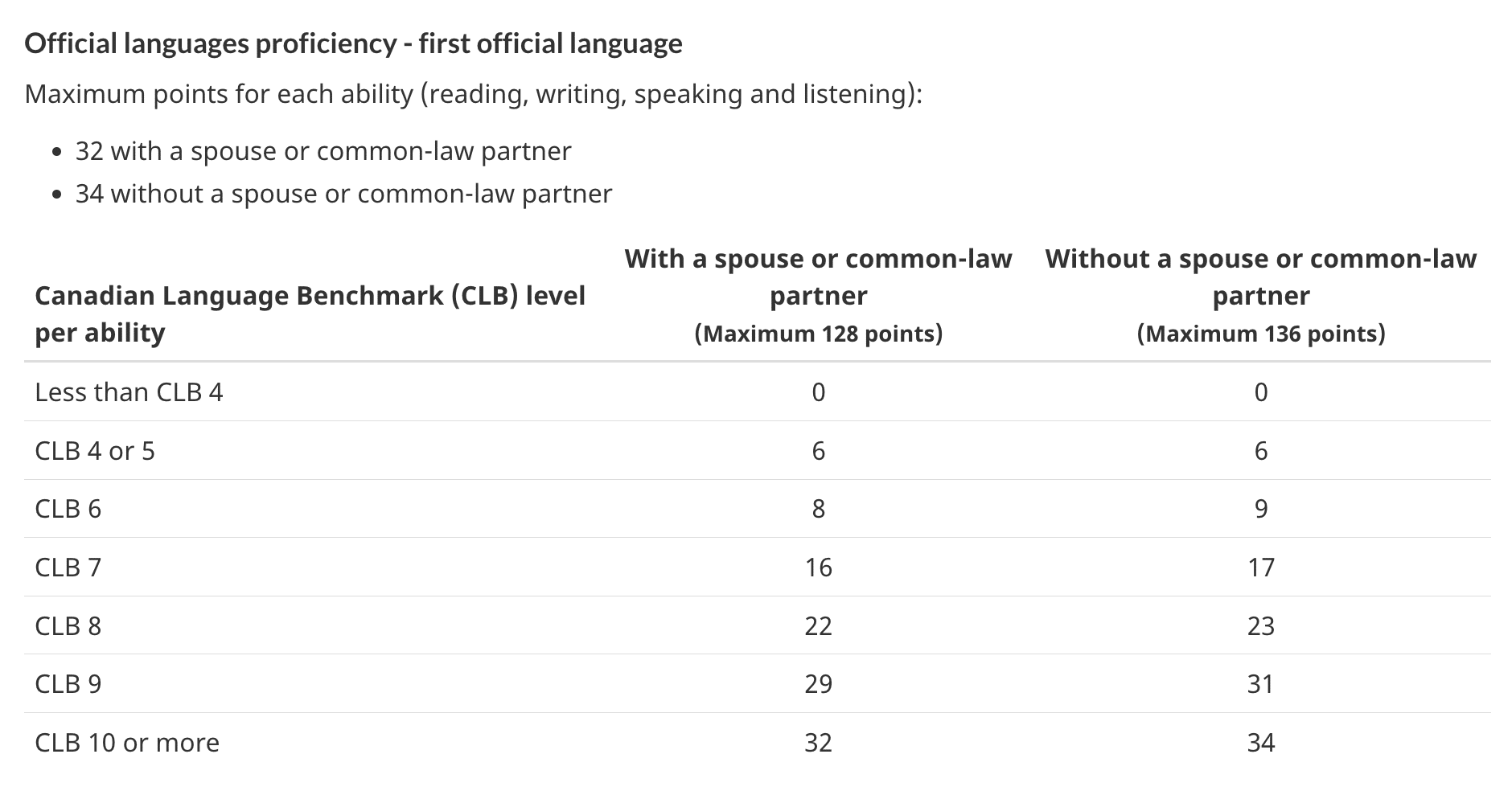
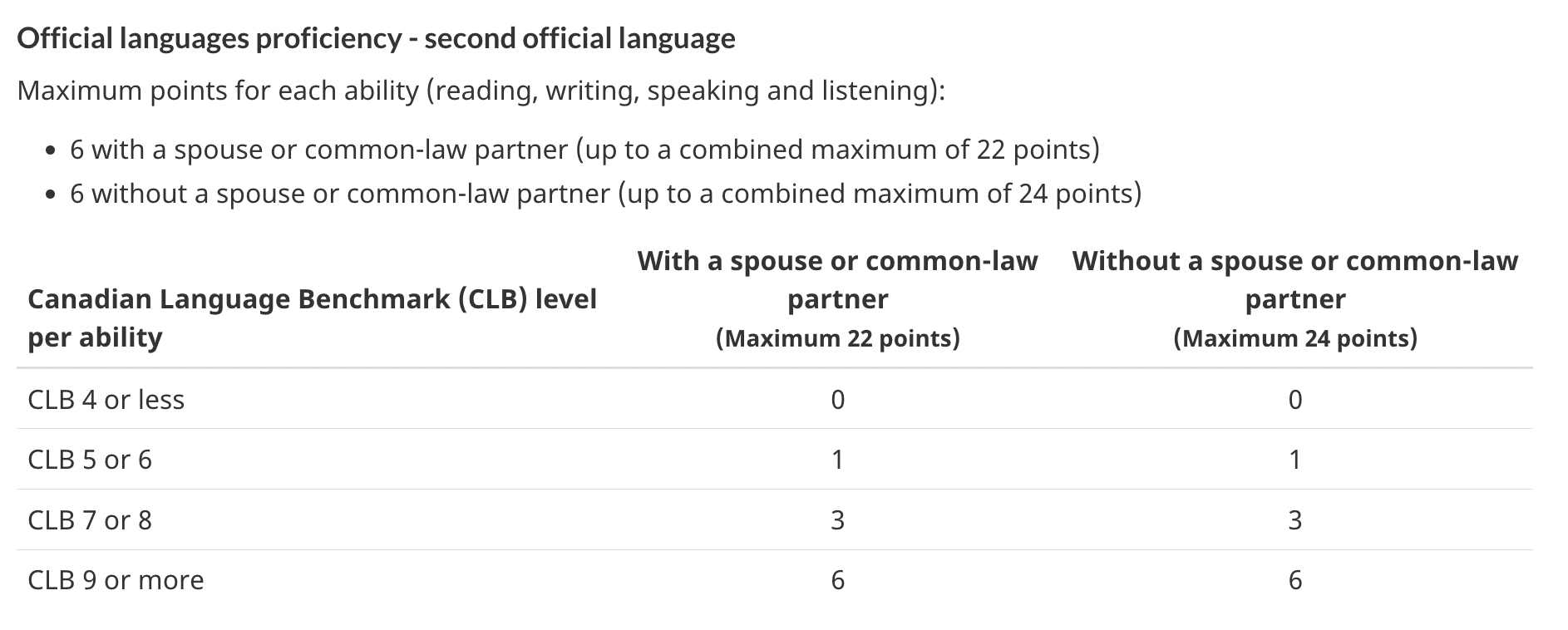
Canadian work experience
The CRS awards Canadian work experience for a maximum of five years—with the consideration that this is one of the most powerful factors in determining an applicant’s future success in the Canadian labour market.
Like other human capital factors, having a significant other accompanying you in your application can reduce an applicant’s score here. Those with an accompanying spouse or common-law partner can earn a maximum of 70 points for their work experience, while those who include their spouse or common-law partner as a non-accompanying dependent are able to gain up to 80 points.

So, does having an accompanying spouse or common-law partner in your immigration application always negatively impact your CRS score?
No! As we will see, applicants with an accompanying spouse or common-law partner in their application have access to another category of points that those with a non-accompanying significant other do not— Category B, Spouse / Common-law partner factors.
For this reason, applicants with an accompanying spouse or common-law partner receive less points in the human capital factors scoring category, to balance scoring equally.
Put simply, the maximum number of CRS points that an immigration applicant can receive for scoring category A (human capital factors) and scoring category B (spouse / common-law partner factors) together is 500—whether they have a spouse or common-law partner in their application or not.
However, while you may receive this maximum score with either an accompanying or non-accompanying spouse or common-law partner, if either you or your significant other lack qualifications to score, you will not receive the total 500 points. Below is a breakdown of how an applicant’s score increases based on their spouse or common-law partner’s human capital factors.
Category B: Spouse or common-law partner factors
This section of the CRS takes into account the same factors as Category A, but for the accompanying spouse or common-law partner listed in an applicant’s immigration application.
Spouse’s or common-law partner’s level of education
Applicants can receive a maximum of 10 points for their accompanying spouse or common-law partner’s level of education. Recall that in CRS category A, applicants with an accompanying spouse or common-law partner received only 140 points for their own education in Category A, while those with a non-accompanying significant other received a maximum of 150. These 10 points make up the difference.
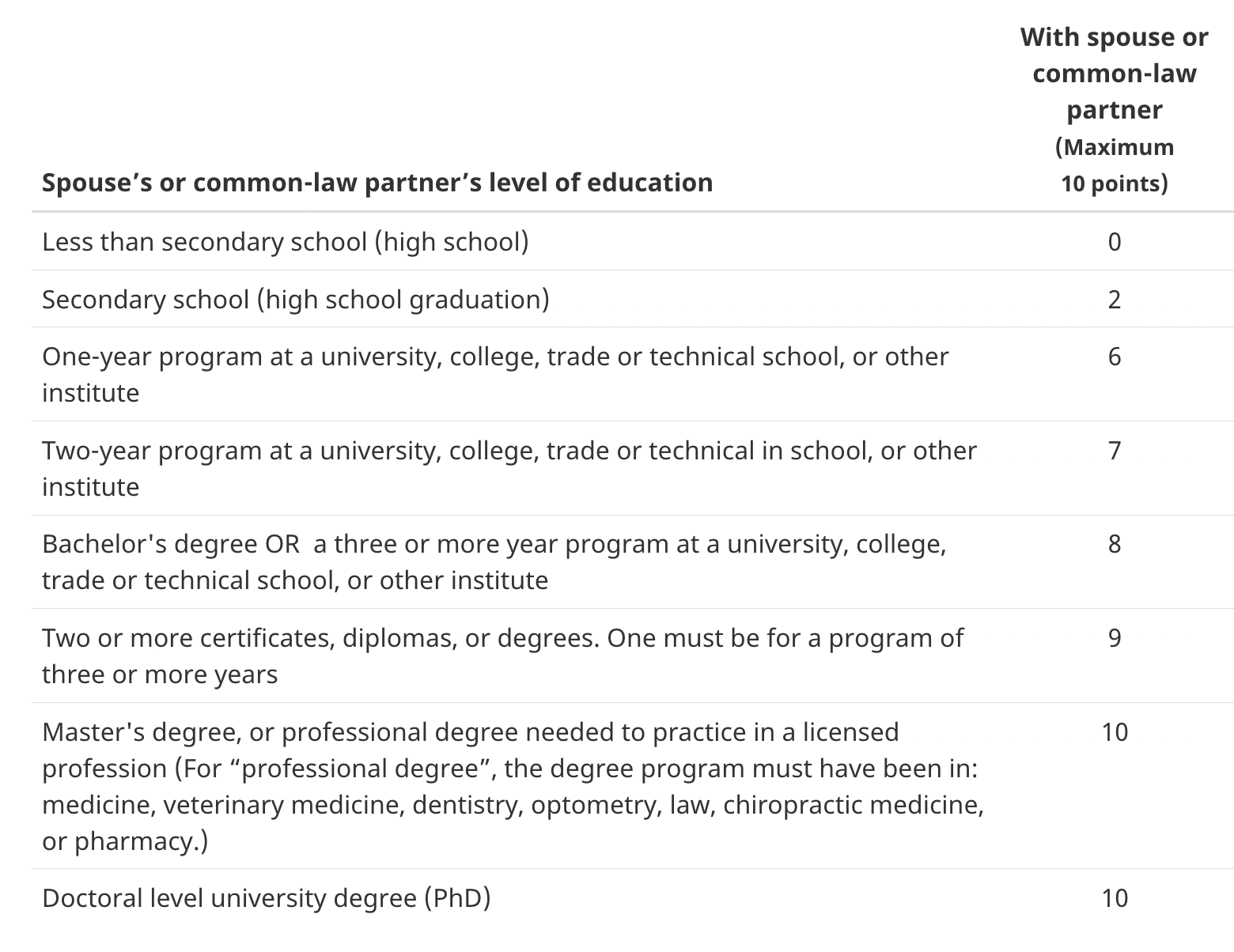
Spouse or common-law partner’s official language ability
Applicants can receive a maximum of 20 additional points for their accompanying spouse or common-law partner’s official language ability, in one language (a spouse or common-law partner’s ability in a second language is not assessed under the CRS).
In Category A, applicants with an accompanying spouse or common-law partner could receive a maximum of 128 points for ability in their first language, and 22 points for their ability in a second language (a total of 150 possible points). Meanwhile applicants without a spouse or common-law partner received a maximum of 136 points for ability in their first language, and 24 points for ability in their second language (a total of 160 possible points).
However, with these additional 20 points, for a spouse or common-law partner’s language ability, applicants with an accompanying significant other in their application can score a potential maximum of 170 points —to make up for the fact that their significant other’s second language will not be assessed.
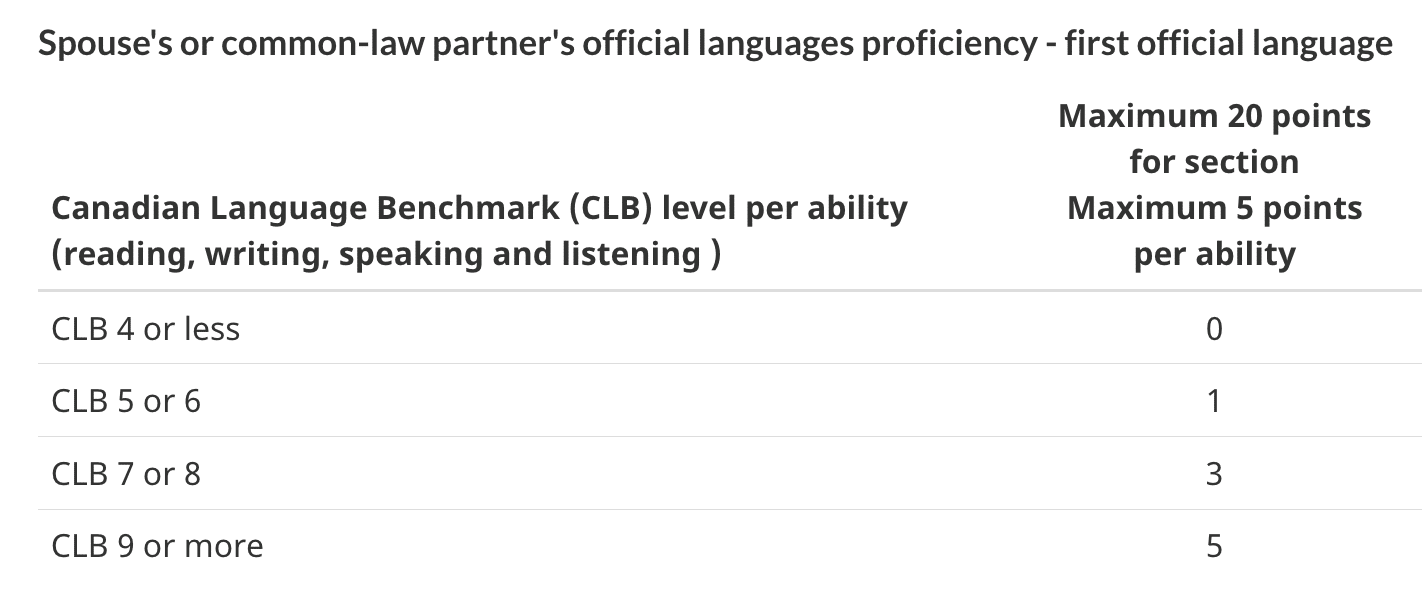
Spouse or common-law partner’s Canadian work experience
Lastly, applicants can receive a maximum of 10 extra points for their accompanying significant other’s Canadian work experience.
Like with the points attribution for a principal applicant’s level of education, these 10 points make up the difference seen between points allocated for Canadian work experience between those with an accompanying or non-accompanying spouse or common-law partner in their application, in Category A of the CRS.
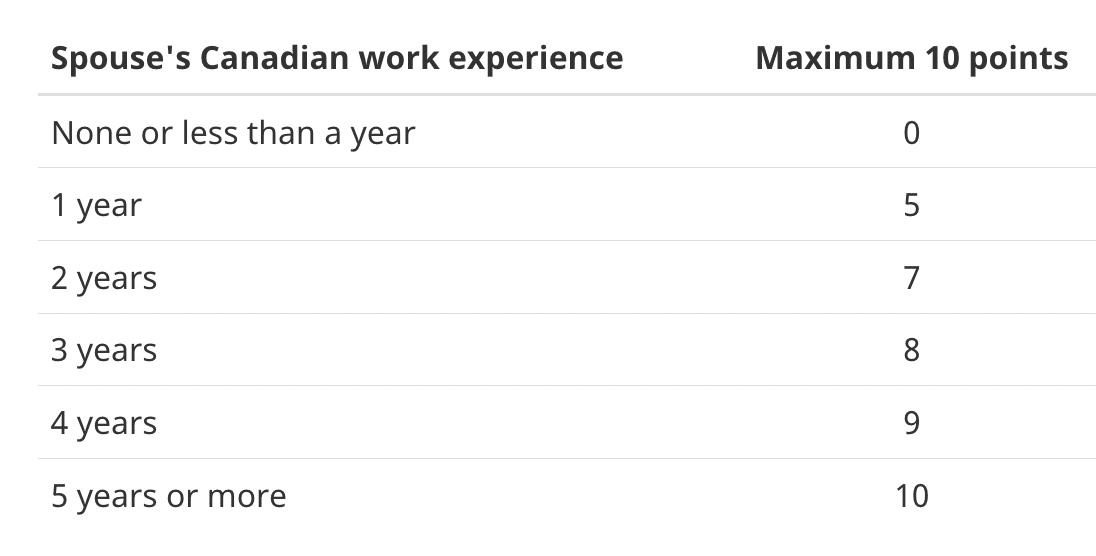
The bottom line
While the maximum number of points achievable in Category A + Category B of the CRS remain the same for those with an accompanying or non-accompanying spouse or common-law partner in their application—the choice to include one’s significant other to accompany them for a better life in Canada, is often non-negotiable.
As in life, loved ones can find unique ways to assist each other in their Canadian immigration journeys. One common strategy in this regard is for both the principal applicant and their accompanying spouse or common-law partner to enter their own profile in the IRCC pool—working together to enhance and improve each other’s score.
Note: If your spouse or partner is already a Canadian citizen or permanent resident, you will earn points as if you don’t have an accompanying spouse or partner. In this case, however, you may be able eligible for spousal sponsorship.
- Do you need Canadian immigration assistance? Contact the Contact Cohen Immigration Law firm by completing our form
- Send us your feedback or your non-legal assistance questions by emailing us at media@canadavisa.com




